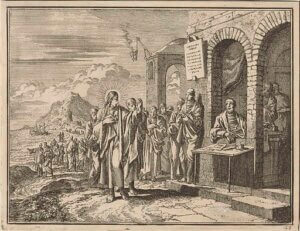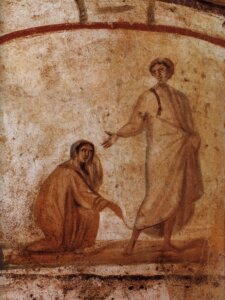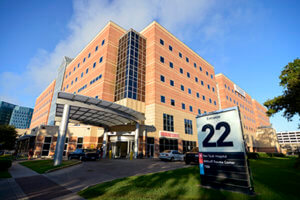
God’s Mercy
As Jesus was walking along, he saw a man called Matthew sitting at the tax booth; and he said to him, “Follow me.” And he got up and followed him. And as he sat at dinner in the house, many tax collectors and sinners came and were sitting with him and his disciples. When the Pharisees saw this, they said to his disciples, “Why does your teacher eat with tax collectors and sinners?” But when he heard this, he said, “Those who are well have no need of a physician, but those who are sick. Go and learn what this means, ‘I desire mercy, not sacrifice.’ For I have come to call not the righteous but sinners.”
While he was saying these things to them, suddenly a leader of the synagogue came in and knelt before him, saying, “My daughter has just died; but come and lay your hand on her, and she will live.” And Jesus got up and followed him, with his disciples. Then suddenly a woman who had been suering from hemorrhages for twelve years came up behind him and touched the fringe of his cloak, for she said to herself, “If I only touch his cloak, I will be made well.” Jesus turned, and seeing her he said, “Take heart, daughter; your faith has made you well.” And instantly the woman was made well. When Jesus came to the leader’s house and saw the ute players and the crowd making a commotion, he said, “Go away; for the girl is not dead but sleeping.” And they laughed at him. But when the crowd had been put outside, he went in and took her by the hand, and the girl got up. And the report of this spread throughout that district.
– Matthew 9:9-13, 18-26
Since the end of last November, we have been moving through the special seasons of the church. We have followed the arc of Jesus’ life in the gospel of Matthew through Advent, Christmas, Epiphany, Lent, and Easter, finally celebrating the descent of the Holy Spirit at Pentecost.
Today we come down to earth and begin the long season after Pentecost, that we call “ordinary time;” it is marked by green altar hangings and vestments. We will continue with stories from Jesus’ life and ministry from Matthew until Advent rolls around again on December 3 and we pick up the gospel of Mark.
 You recall the phrase “What would Jesus do?” the trendy motto that some Christians took up in the 1990s? The fad has passed, but for disciples—people like us—it’s still a good question—the question, in fact. What would Jesus do…and say? The gospel accounts of Jesus words and deeds give us an idea.
You recall the phrase “What would Jesus do?” the trendy motto that some Christians took up in the 1990s? The fad has passed, but for disciples—people like us—it’s still a good question—the question, in fact. What would Jesus do…and say? The gospel accounts of Jesus words and deeds give us an idea.
Each gospel, written for a different community, has a slightly different point of view, and different emphases. In Matthew Jesus repeatedly stresses, mercy as God’s will. It’s in the beginning, in the beatitudes: “Blessed are the merciful, for they will obtain mercy.” And much more forcefully at the end, in Matthew 25. There, in Jesus’ vision of the Last Judgment, he makes doing the corporal acts of mercy the ultimate criteria in what separates the sheep from the goats: feeding the hungry, clothing the naked, caring for the sick, visiting the imprisoned, welcoming the stranger.
But here in chapter 9, it’s relatively early in Jesus’ ministry, and in his teaching the disciples. He says to them: “Go and learn what this means ‘I desire mercy, not sacrifice’”. “I desire mercy, not sacrifice.” That’s a quote from the Hebrew prophet Hosea.
Today’s lectionary combines two episodes that show Jesus’ mercy in action.
Calling of Matthew
 First, the calling of Matthew. As you know, tax collectors were dubious characters. While working for the Roman Empire, some of them cheated people to line their own pockets. The Pharisees scorned and shunned tax collectors, yet Jesus reached out to them. He called Matthew to be his disciple, then he broke bread with them and other people whom the self-righteous Pharisees condemned. The Pharisees think they are pure, above the rest. So they probably miss the irony in Jesus’ retort: “I have come to call not the righteous but sinners.”
First, the calling of Matthew. As you know, tax collectors were dubious characters. While working for the Roman Empire, some of them cheated people to line their own pockets. The Pharisees scorned and shunned tax collectors, yet Jesus reached out to them. He called Matthew to be his disciple, then he broke bread with them and other people whom the self-righteous Pharisees condemned. The Pharisees think they are pure, above the rest. So they probably miss the irony in Jesus’ retort: “I have come to call not the righteous but sinners.”
In the second episode, a leader of the synagogue appeals to Jesus to heal his daughter, who has just died. Without hesitation, Jesus moves to help. As he is on his way, a woman who has been plagued with bleeding for years touches Jesus’ cloak, praying that his power will heal her. And it does. Then, when Jesus reaches the girl, whose death is already being mourned, he lifts her up and brings her back to life.
Let’s look more closely at those intertwined healing stories.
Desperation
 There are stark social differences between the leader of the synagogue and the woman with the issue of blood. The man was prominent, highly respected in the social and religious community. Free to approach Jesus in public, he could be confident that Jesus would listen. In contrast, the woman with hemorrhages was a total outcast. According to Jewish beliefs at the time, her bleeding made her ritually unclean. She was forbidden to worship in community or be in public at all, lest she touch or be touched by others and make them unclean in turn. Rather than dare come to Jesus in the open, she furtively melded with the crowds and touched Jesus’ cloak.
There are stark social differences between the leader of the synagogue and the woman with the issue of blood. The man was prominent, highly respected in the social and religious community. Free to approach Jesus in public, he could be confident that Jesus would listen. In contrast, the woman with hemorrhages was a total outcast. According to Jewish beliefs at the time, her bleeding made her ritually unclean. She was forbidden to worship in community or be in public at all, lest she touch or be touched by others and make them unclean in turn. Rather than dare come to Jesus in the open, she furtively melded with the crowds and touched Jesus’ cloak.
The man and the woman also have important things in common. Both are desperate. Both feel helpless. So helpless, so desperate, that each of them is willing to put Jesus at risk in Jewish purity codes. I’ve already said how that was true for the woman. But the leader wants Jesus to touch and heal his daughter. The dead girl’s body was as ritually unclean as the woman’s.
Desperation is the ultimate social leveler. I learned that in my months as a chaplain intern at Ben Taub Hospital in the Texas Medical Center, Houston. Ben Taub is a charity hospital: the patients in the wards are poor. It also has the top, level one trauma center in the region. Only the most critical cases are brought there. Patients are from every level of society and the most diverse range of cultures anywhere in the country. Each and every one is cared for equally by the superb medical professionals on staff.
 The folks in the waiting room are as diverse as the patients. Social, economic, and cultural differences quickly dissolve in the mixture of shock, sorrow, and hope that fills the air there. Everyone is on equal ground. You recall the old military saying that there are no atheists in foxholes. It really felt like that in the Ben Taub ER waiting rooms: people of every faith and none at all were praying in their hearts.
The folks in the waiting room are as diverse as the patients. Social, economic, and cultural differences quickly dissolve in the mixture of shock, sorrow, and hope that fills the air there. Everyone is on equal ground. You recall the old military saying that there are no atheists in foxholes. It really felt like that in the Ben Taub ER waiting rooms: people of every faith and none at all were praying in their hearts.
Back to our gospel. In his despair, the leader of the synagogue was so deeply humbled that he knelt before Jesus, pleading for help. No longer a prominent citizen, just a vulnerable child of God in need of mercy.
Jesus Responded Equally
Jesus responded to him and to the woman equally. Jesus believed them, accepted them, respected them, and did what he could to help them without regard to their social standing. To Jesus, the leading citizen and the outcast were the same.
God’s mercy knows no bounds. As an agent of God’s mercy, Jesus acted completely without regard to personal risk, or to what other people thought of him and the people whom he helped.
Our Judeo-Christian ethic calls us to do the same, treating every person equally, as we feed the hungry, clothe the naked, visit the sick and those in prison, and welcome the stranger.
Those are some of the things we do in our ministries at Emmanuel, and what many of you do on your own, outside of the church.
We can always do more, of course. And I urge you to join one of Emmanuel’s ministries that fits your gifts. I am trying to do more a gain, after Covid. But what I’m doing is different than before. I’m three years older now. My limitations hit me when I was on the MLK Mobile Pantry team in August 2019, on the hottest day of the year. The mobile pantry is amazing. It’s a truck loaded with the full range of food from the Pantry, including non-perishables, fresh fruit and vegetables, eggs, milk and frozen meats. The truck goes out on Tuesday and Thursday, making a monthly stop for people in public housing complexes around the Island.
gain, after Covid. But what I’m doing is different than before. I’m three years older now. My limitations hit me when I was on the MLK Mobile Pantry team in August 2019, on the hottest day of the year. The mobile pantry is amazing. It’s a truck loaded with the full range of food from the Pantry, including non-perishables, fresh fruit and vegetables, eggs, milk and frozen meats. The truck goes out on Tuesday and Thursday, making a monthly stop for people in public housing complexes around the Island.
That day we had set up outside because of COVID. After two hours of serving people, in the greatest heat of the day, were loading the heavy carts and racks back on the truck. I gave out. The oldest of my teammates were 52 and 62. I was 72 and realized I’m not up to that much heavy work anymore. Now I’m doing more with the pantry indoors and thinking of new ways to serve.
Mercy is a disposition of heart and mind, a way of being in the world with compassion, benevolence, and forgiveness. It can take many forms. Lending a gentle, listening ear or giving words of comfort to someone who is suffering are acts of mercy that people of any age can do.
Maggie Dawn gave us another act of mercy in her sermon last week, one that we can freely share: let people know that according to God’s words in Genesis, each one of them, of us, is really very good.
